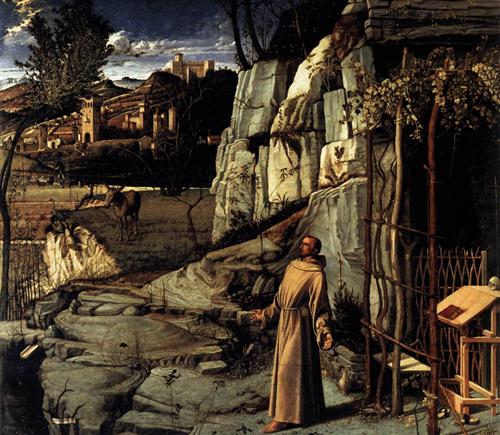My cousin Catherine Larson has made her front curb in Eugene, Oregon a place to renew one’s thinking by putting poetry out from time to time, so that anyone who walks by can be moved and inspired. The St. Francis poem that happened to be in the frame when I last visited her caught my attention today when I was looking over the year’s photographs.
It’s time to bring Saint Francis in,
the statue in the yard that stands
through summer heat and autumn rain
to welcome birds and butterflies
to water cupped between his hands.
For Brother Ice and winter thaw
might crack his terra-cotta flesh
and break the saint to shards and bits,
so friar must become a monk
in the cellar or barn until
the spring releases him to preach
to insect, mockingbird, and field.by Robert Morgan
To me the poem expresses the idea that even St. Francis needed to take a break from time to time; he was known to apologize for his “animal” needs by referring to his body as “Brother Ass,” because he needed to take time to give himself food, drink, and sleep, even when his mind might want to continue to pray. The poem also reminds us that the winter wears on us, and like the terra-cotta statue that will crack under the ice and snow if it is not protected, sometimes we need to rest, and stay inside for a spell to prepare for our work in the seasons ahead.
We forget that for there to be life and renewal there must be a season of death and dying. The earth is at the point in its orbit when there is a “dying of the light,” as the nights are at their longest in the cycle of the year. It is for this reason so many cultures celebrate a festival of lights at the time of the winter solstice. We need to kindle the inner creative spark that is nourished when we gather together for company in this time of greatest darkness. In the I-Ching, an oracle is devoted to this sacred time; “The Darkening of the Light” refers to the similar cycles that occur in our governments and society, when there are shifts in power, and seasons when tyrants emerge, and there are those who bring harm to good and able people. At such times, it is important to veil one’s light, without being duped, but to maintain the inner light, taking time to reflect to see into the meaning of what we must do when we have gathered our strength.
I send this along to all those who may be feeling a time of retreat, of loss, or of mourning, to remember that in our darkest hours, the turn of the seasons continues, and it is part of a natural cycle to retreat in order to strengthen. Animals hibernate; the trees die back before it is time to flower again in the coming season. The darkest time of the year is a good time to nourish the inner light. We are not always in flower, and our seasons of retreat have their own beauty, poetry and meaning.
Francis did not believe great possessions were needed to live a passionate and spiritual life. Each of us can think of small, simple, sincere ways to make the world a place of beauty and to give refuge to others. Catherine did this by creating her poetry niche in front of her house, and she changes the poems whenever the spirit moves her to do so. This beautiful type of activism is one I hope to imitate in my daily life this year. On a day to day basis, we may not feel we can do very much, but perhaps we can keep in mind the act of sharing Robert Morgan’s poem about St. Francis as we do the simplest things in our power.

Saint Francis in Ecstasy, Giovanni Bellini, 1480-85

Ellen
Thank you, Charity, for your words of truth and inspiration. What a welcome respite from the doldrums of winter and *sigh* a very dark November. I will continue to look to my own garden St. Francis for peace.